#Pratha
Text





हिन्दू धर्म में मुंडन प्रथा से आशीर्वाद, वृद्धि और पवित्रता प्राप्त होती है। लेकिन क्या आप इस पौराणिक प्रथा के वैज्ञानिक लाभ जानते हैं?
इस पोस्ट को सेव और शेयर करें और कमेंट में 'जय हिंद' अवश्य लिखें ।
आज ही #IMAVATAR ऐप डाउनलोड करें। और हमारे धार्मिक एवं आध्यात्मिक दुनिया से जुड़ने के लिए, क्लिक करें https://linktr.ee/imavatar
0 notes
Text
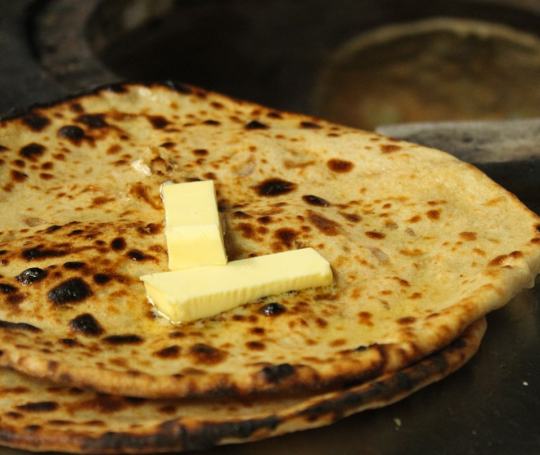
Fresh tandoori prathas to kick start your weekend...
Call now : 02 8022 8500
H 141A, LOWER LEVEL, 28 LEXINGTON DR BELLA VISTA NSW 2153
#gazab#gazabbellavista#gazabindianrestaurant#sundayfunday#sundaybreakfast#chanabhatura#amritsarikulcha#aalooparatha#indianrestaurant_near_me#bellavistafood#Pratha#weekendvibes#weekendbreakfast#indianbrunch
0 notes
Text
if it was rational it wouldnt have been love.
#romeo juliet#orpheus eurydice#jack rose#shiv sati#savitri satyavan#i don't particularly like sati sacrificing herself tbh espl espl because how that led to sati pratha#but when seen from a viewpoint isolated from mythology and more as a fiction with no repercussions- it sends me#espl keeping in mind how lord shiv reacted.#but as i said i look at mythology from a purely fictional pov- something that is just meant to entertain. but it doesnt work like that irl.#adding community labels because i dont want a lot of people coming across it#12 years‚ yet your side of the bed is warm still
20 notes
·
View notes
Photo



Rebecca Romjin, Anson Mount & Ethan Peck | Watch | Saty + Pratha | May/June 2022
98 notes
·
View notes
Text
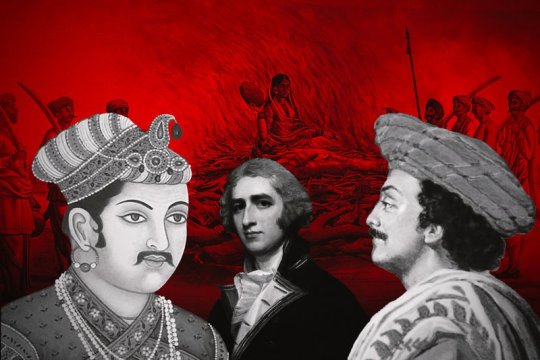
Abolition of Sati: History & Facts
Have you watched the movies Padmaavat, Prithviraj Chauhan and Mangal Pandey? These movies displayed the practice of Sati and Jauhar in which women were burnt alive if their husbands were dead. In 1724, at the funeral of Ajit Singh of Marwar Jodhpur, sixty-six women were burned alive; similarly, eighty-four women sacrificed their lives at the funeral of Budh Singh (a king of Bundi). From this, we can say that it became a common practice in ancient India. However, even after the abolishment, the practice continued in most rural regions of India and gained all the controversial aspects of all time. So, let’s discuss Sati in detail, starting from who Sati is to where this practice stands in Modern India.
Who is Sati?
The word ‘Sati’ originated from Goddess Sati, as she was the first woman to initiate this practice. On the one hand, Sati was regarded as a glorious, dignified sacrifice and a way to clear the spouse’s sins; on the other hand, some people considered it their private matter to accompany their loved one to death.
What is Sati's custom?
Hinduism is the oldest religion, following various practices, among which Sati custom was constant for a very long time. Sati, aka “suttee”, is the practice of burning a woman alive after her husband’s death because it is considered her duty according to the religious texts of Hindus.
Reasons behind Sati Practice
There are two reasons why the Sati tradition started are discussed below:
1. Upper-class funerals- The idea of cremating a husband with his wife came from the belief that a man should be cremated with his precious possessions, and women were then regarded as one of them. It was written in Hindu texts that a woman who burns herself alive with her deceased husband would be promised an afterlife in heaven.
2. Safety of widows- Sati practice was regarded as protection from enemy invasions. At that time, when the Mughals, after their victory, used to enter Rajput kingdoms and take away their wives. To prevent themselves from falling into the hands of the Mughals, the wives of the deceased soldiers immolated themselves. Queen Padmini For example, Queen Padmini and her women followers killed themselves to escape being captured by Delhi’s Muslim monarch, Alauddin Khilji. Many think Sati was created solely to protect women from being captured by Muslims who entered India due to this incident.
Who stopped the Sati system in India, and when?
In the ancient period, the first ones who tried to ban this tradition were Muslim rulers of India named Mughals and Nizams. Since many people criticised them, the practice continued. In the 19th century, during British rule, the Governor of India, William Bentick, gave the order to abolish this practice.
Banning of Sati Practice
Many people allege that this practice has been performed since 510 AD, and there are signs in religious scriptures that imply that it was present even before 510 AD and was performed by specific tribes. Greek visitors who visited North India claim that Sati was practised in the 4th century B.C. this practice was not so common in the 18th century; however, it became a widespread practice in the 13th century. This practice became so popular that even tourists knew that India had such dreadful beliefs.
Initially, women practised Sati voluntarily, but with time, it evolved into a coercive act. They say that everything changes with time and people’s opinions on Sati have also changed. The situation deteriorated, but later, in modern India, specific laws were enacted to outlaw the practice, and now it is illegal and widely disregarded by the people.
Sati in medieval India
In the 7th century, it was predicted by a Sanskrit poet that it was a constant practice in Upper Hindu classes. Sati in the 14th century was at its peak in the Vijay Nagar empire. The warriors of the Goudas and Gayakas classes of Hindus performed this act of Sati.
Some incidents included the King of Madura, who died because of illness, and his wife committed Sati. Another incident of Sati happened when King Pandyan died, and his 47 wives sacrificed their lives at his funeral. There are many other similar incidents in that era.
Sati in the Medieval era
- Nizam tried to prohibit sati in Hyderabad in 1847 by issuing an order that whoever committed Sati would be held guilty and punished accordingly. However, this attempt failed as there were still many cases of Sati Pratha in that area.
- In North India, Sati was practised by upper-class Hindus such as Brahmins, whereas in South India, it was performed by royal families, peasants from the lower caste and nobles.
- For the sake of humanitarianism, Christian missionaries opposed the Sati practice long before the British did. The Bombay government outlawed Sati and issued warnings against its approach to the rulers of Gujarat, including Devgadh Baria (1840), Baroda (1840), Lunawada (1840), Rajpipla (1840), Mahikantha (1843), and Palanpur (1848). However, many of them broke the law and were consequently penalised.
Which Mughal emperor tried to ban the Sati system?
During the Mughal period, Sati was a standard practice followed by both Hindus and Muslims. Sati paratha was observed in almost all the areas of Mughal India, which mainly focused on the Ganges Valley, Madura and Vijaynagar in South India and Punjab and Rajputana in the North.
- The Indian tradition of Sati, in which a woman immolates herself even against her consent, is mentioned by Akbarnama.
- The first Muslim king to protest and speak out against Sati was Mohammed bin Tughlak. He made it necessary to obtain a licence before burning the widow, discouraging Sati and ending the practice of forcibly immolating widows.
- Following him, Humayun and Akbar both attempted to end Sati’s coercive performance. Still, Akbar insisted that if a Hindu woman wanted to perform Sati, they would not stop her against her will. Sometimes, he intervened to put a stop to this.
- Jahangir then made infanticide and Sati illegal. However, some contend that the prohibition was merely in writing and was not fully adhered to. Shah Jahan, after him, prohibited pregnant women from performing Sati and allowed widows’ children to attend school.
Aurangzeb, in contrast to him, outlawed Sati in his reign. However, it was only a temporary solution; there have been instances where Sati has been practised despite being illegal.
Continue reading…
0 notes
Text

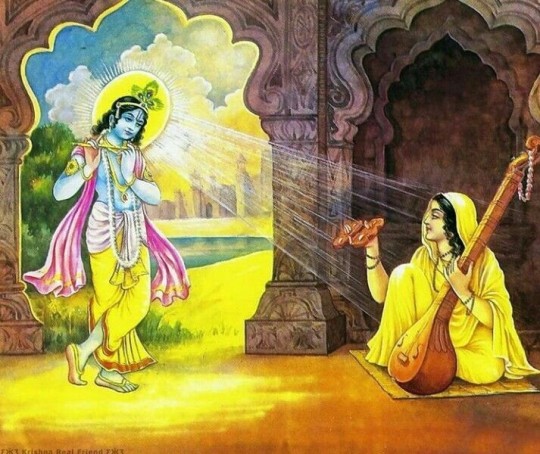




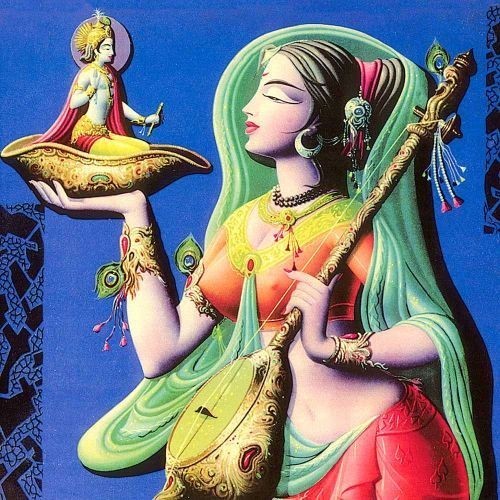

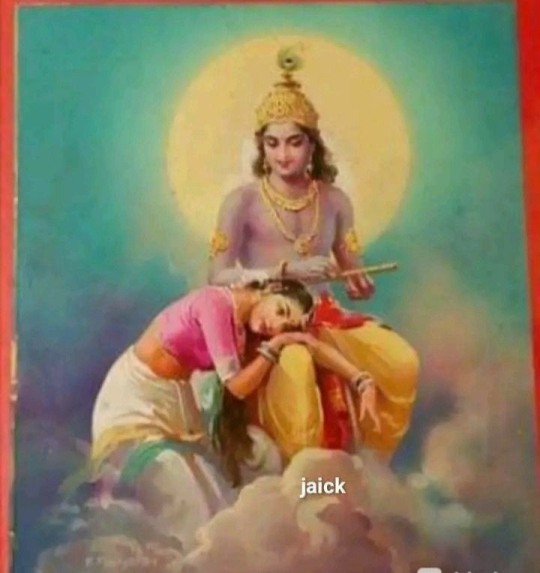
Meera Ke Prabhu Girdhar Naagar
Krishna looked on
As he had looked on when she had been given poison which turned to nectar when she offered it to him
As he had looked on when snakes were thrown at her but again she offered it to him like flowers and it turned into a garland
It was just his murti that looked on
But for Meera it was really him
How else would she be saved from death's grasp every time if it wasn't Krishna himself looking out for her?
She sang to him as she always did but tonight there was a sad undertone
She had had enough
Despite being the queen, she was constantly harassed by her devar
She remininsced about her husband who she respected. He let her do her duties and then spend the rest of the time in the temple of the Mahal with her beloved Krishna. But after his death, she was being tormented by his brother.
She folded her hands to Krishna's murti and then at the jauhar kund where her mother in law, the late Maharani, had done jauhar with thousands of other women when Akbar had attacked Chittorgarh
"Mother, not everyone can do what you did. Not even me. You held on to your honour till your very last breath. But jauhar is done by those when the invaders close in with their egos. What about those who are attacked by their own family? There is no such pratha that can save them. My husband, your son, was a benevolent king. But your other son.. If I commit Jauhar my image will be tarnished forever because there are no invaders. Jauhar is done by those who have no other hope, mother. But I have one." she turned to look at her Krishna with teary eyes
"The only element I'd let myself to be consumed by is him. My only hope since birth, to death, is him."
"Maharani" a daasi entered the temple and curtsied "I apologize for interrupting your prayers."
Meera didn't turn around but she closed her eyes and nodded as the tears rolled down
"Your highness, you really need to leave. He is on his way back to the palace. I can't see you-" she stopped herself as she was about to mention Meera's bruises and scars caused by her brother in law's abuse
It was a wonder indeed because when the daasi had seen them for the first time and pointed it out Meera had calmly replied that she didn't feel a thing because she was thinking of Krishna
"Why does your Krishna allow so much pain in your life?" the daasi's voice cracked on seeing her queen like this so she looked away
"No. Not a word against him. I would've been long dead if it weren't for him." Meera put a hand on her shoulder and smiled
"You should ask him to hold you with him forever, away from it all"
"Maharani!" A soldier came huffing and curtsied rigidly "Sincere apologies but they're on the horsebacks and can arrive any moment now."
Meera stood up hurriedly and collected her pooja samagri, dashing. But just at the gate, she stopped
"Does running away make me a coward?" She whispered
"No, maharani. You are going to your lord." the daasi said
"No no no wait! What about YOU ALL?" Meera's voice rose and suddenly an arrow whizzed past them
"DON'T worry about us, Maharani! Just GO PLEASE AAPKO SHRI KRISHN KI SAUGANDH!"
The soldier winced in pain as an arrow was shot again which lodged itself in his arm.
The daasi almost shrieked but carried him over and dragged him outside.
Meera saw a lover's spark between the two and despite the situation she smiled. She silently prayed to Krishna for their protection
And then she ran
She ran and ran and ran throughout the villages, the jungles, her feet and knees getting scraped, she went on for days without food or water and she ran
"I'm waiting, sakhi" a voice breathed in her ear
Finally she reached Dwarka and broke down at Dwarkadheesh's feet
A few days were spent in bliss as she became the poet she was meant to be
But not for long because they followed her even there
The time had come
She took a last, long breath in front of the murti
And closing her eyes, she folded her hands
"Swami. The world has never understood me. It has only given me agony until I met you. The only love I've ever felt is when I've thought of you. So I did. Until you became every thought of mine, written on every breath of mine. The only thing I've ever longed for is to be associated with you for as long as the kaal chakra goes on, my name be taken in the same breath as your name. But who am I? I'm not your lover who you'd playfully burst the maakhan matki of, I'm not your wife who you'd immediately, fiercely, desperately ride on your chariot to rescue. I'm not even a devotee like Hanuman ji who had the opportunity to be alive in the same yug to serve his God. Who am I to be yours? But where else am I to go? I can't survive in any place which isn't your heart.
The world has come to get me again so I come to you. And I won't breathe until I reach you"
She started walking to the murti, holding her hands out as alms
The tyrants were upon her now but suddenly they were dazzled by a bright light
And then a divine hand extended out to her, he smiled with tears streaming all the way as Meera immersed herself completely in Krishna
The light vanished. They opened their eyes again and were baffled to see Meera gone.
Except her dupatta that swayed peacefully from the side of the murti
Centuries later
"Mother! Whose is that?" a small voice pointed excitedly
The woman looked on and recognized Meerabai's dupatta
"The legendary poet bhakt of Krishna, child. Her name was Meerabai."
"Was she married to him?" curiosity sparked in her eyes
The woman thought for a bit. It wouldn't be that simple to explain to her little daughter the leelas of Shri Krishna with his many wives and lovers.
The girl looked at the murti now "Did they both love each other?"
"Yes" the woman answered, smiling
"Of course" her daughter nodded, completely satisfied "Just look at him! Who wouldn't fall in love with him?" as she laughed and swooned, swinging around a nearby pillar as Meerabai's dupatta swayed higher and touched the little girl's head
Meanwhile, Krishna grinned at the whole scene as Meera joined her, laying her head on his lap as she whispered
"It feels like I've waited for you since forever."
"I know, love. And I have, too. But I've been with you all the way. It broke my heart to see what they did to you." He kissed her forehead
"You are safe now" As he held on tight to her for eternity
Not just two lovers, but the union of two forms that go back to the same source to begin with. The river finally meeting the sea, the rain kissing the soil, incense embracing the ambience and far away just a besotted finally flying to the muse
Meera uniting with Krishna
#desiblr#desi#desi aesthetic#desi tag#desi culture#desi dark academia#desi girl#desi stuff#desi academia#just desi things#krishna#krishnablr#gopi#gopiblr#meerabai#meera bai#hindublr#hinduism#hindu mythology#indian culture#indian aesthetic#bhakti#raas#vishnu#narayana
81 notes
·
View notes
Text
Saheb, Bibi aur Ghulaam
#3

Thank you to the lovelies @arshifiesta for celebrating IPK and setting up the great moodboards and AU.
1878, Calcutta
Eleven years old Arnav Mullick had not spoken a word in a year.
Some thought it was his parents' traumatizing deaths that led to his silence. But death was nothing new. The house had lost its middle son, his Mejda Akash at tender age of 19.
So no, death made no difference to Arnav. In fact he was happy when his philanderer of a father died of drinking as well. He deserved it. Not once had he seen his father home at night.
Arobindo Mullick would often scoff when stopped, that if any man of this house had ever spent a night in his own house?
So then some speculated that Arnav's behavioral issues had gotten worse, hence why he stopped speaking for a year.
If his darling mother was alive, she would've wrestled with anyone who thought such against her Arnob. Shyam, Arnav's Borda (boro-dada = older-brother) would perhaps be the only one to chuckle and agree with the society. Arnav was tempestuous as a child.
But quiet? Never quite.
The society would never understand that it was Akash's falling for a Baiji (courtesan) at the age of seventeen, his frequent visits leading his early introduction to alcohol despite their mother's best to protect them for it that hurt Arnav the most.
This was when Arnav swore off love.
That his otherwise pious brother was gullible to follow his father's footsteps to a kotha - where Arobindo Mullick spent all his nights.
It was his mother's haunted face and tears that left Arnav speechless. Or rather Arobindo's reply to her request to stay at home.
Has any Mullick ever spent a night in their own home?
This was when Arnav swore off marriage.
Or that despite Raja Rammohan Roy having abolished Sati-pratha a good sixty years ago, Arnav's mother was dragged to her undeserving husband's pyre by her conservative in-laws to follow patni dharam.
This was when Arnav swore off religion.
But if maa was alive, what life would she have had? Arnav saw how his uncle, Kaku, eyed her. And Arnav had seen that in the months prior to his mother's death, how she was shaved, dressed in white and forced into a strictly ritualistic dreary life.
His mother, whose hair spilled like the Ganges from Himalaya, had a beauty who could rival the Goddess, lived a life none deserved simply out of rituals and religion.
Thus when Shyam gave their mother mukh-agni, Arnav found his devotion die in his mother's pyre. And when his only hope, Borda (Shyam) set sail to London abandoning him, his words died as well.
-- -- --
1880, Calcutta
Arnav had been wrong about Borda. He returned as a Barrister from London, swiftly kicking out Kaku (father's younger brother) by bringing up property possession rights and threatened the rest of the Mullicks with incarceration for having forced their mother to die.
Thirteen years old Arnav did not know what to do when the brother he thought so wrongly about did the most just thing. It was then he decided that he too would run away to London when he came of age.
But the other thing he couldn't figure out was what to do with Boudi (bhabhi; sister in law). Their grandmother had fixed Borda (Shyam's) alliance with a member of the Tagore family.
Barely two years older than him, fifteen years old Anjali Devi was to manage the household of a twenty five years of Shyam Mullick. How could Arnav accept her as the lady of the house when the post truly belonged to Maa and only her.
But Arnav realized no rebellion was needed. Boudi arrived with the biggest reverence to their mother, along with the grief of losing her own. She chatted constantly with Arnav, not questioning his silence at all - Borda had gotten fed up after a few tries.
And over the years Arnav realized he had a sibling more in Boudi than in Borda.
Perhaps, perhaps maa's essence found its way into Anjali Boudi. It would explain why Arnav's first words were celebrated by Anjali as if it was her first child who had uttered their first words.
A child she was unable to give through all of her married life.
And perhaps his family was cursed against joy for the moment Arnav saw his mother in Anjali, he saw his father in Shyam.
The easy money he made as a barrister faded quicker given his lavish expenditure in trying to out-host the British and the Indian royalties. He belittled Anjali's lineage as much as he could and tried to prove that he was a bigger industrialist than the Tagores.
Lawyer he was, businessman he wasn't.
And thus at age eighteen Arnav had to run to London, no longer chasing any dream, but at least attempting to make the fortune his brother boasted of having.
-- -- --
1893, London
London was far more accommodating than India would ever be. This was what Arnav believed until, of course, an intellectual sparring with Boudi's cousin - Rabindranath - would get him thinking about perspectives.
To think of it, majority of India's existing regressive laws were nothing but British Victorian laws.
Then who was regressive?
It had been a lazy afternoon where Arnav was entertaining his thoughts, alone, as usual when a telegraph changed his life.
URGENT STOP SHYAM DA MARRYING AGAIN STOP
Arnav tossed the telegraph aside, grabbed his documents and hailed the first ship - premier class - to India.
He only had two goals.
Stop Shyam Mullick from marrying and ruin everybody who stood as an obstacle to Bo- Didi's happiness.
-- -- --
A/N: Yes, babua is here and so is his very very painful history! Lemme know what you all think :)
Tagging @shiyaravi @maansiloves @featheredclover @chutkiandchotte @laad-governess @msbhagirathi @phuljari @hand-picked-star @barshifan (updating it slowly and steadily)
28 notes
·
View notes
Text
Re-watching Mahabharat (6/?)
Not Karna being scandalized by Dury's adharmi talks
Yudhishthira's room is so pretty, but where is the bed? Where will he sleep? On the sofa?
Dhritarashtra is continuing the Kuruvanshi pratha of uncles manipulating their nephews
Sahadeva's sahadeva sense is working up again~~~~~
Sahadeva's wig is so fckin UGLY. Like my boy deserves better.
How to manipulate Yudi: just say "tum to dharm ke gyaata ho" and move on
I think Yudi knows that he is being manipulated.
"Jis ke putra jeevan kaal me hi mar jate hain uske jeevan me bhi nark aur mrityu ke pashchat bhi nark." YES. And Yudhishthira will be experiencing that feeling in some 20-30 years.
Oh God. Dhritarashtra is that one uncle who convinces you to name your share of property in his sons' name, because you are well settled and don't need it anymore.
Not Arjun and Sahadeva sneaking up on these two XD
Arjun pulling UNO reverse on Dhritarashtra heheheeeeee
I see. Arjun is doing Krishna's job before Krishna enters the picture. Then he will be a dumbass innocent lil sweetie for the rest of his life
Subhadra is such a dumb cutie
FINALLY. A room with a bed. I can die in peace now.
If only the makers had paid some attention to this couple T_T
Arjun has begun his dumb ways. This is the Arjun we know and love.
Arjun is an expert in household chores. EXCELLENT.
Arjun is a simpleton, hence proved. See what you have done. Poor Subhadra is in tears because of you.
Subhadra, you sneaky lil brat. I pity Balarama so much. He has to deal with two drama queen siblings daily.
Le Subhadra: a trip with Arjun? YAYYYYYYYYY PAWWRTYYYY
Ngl, this is one of my fav episodes in this show. Maybe it has something to do with the fact that Krishna enters in this one.
No Kunti, there is no dharm in Dury's heart.
So....Kalyavan is a white male, going with the description?......
Arjun is having a laugh at Subhadra's expense, XD
oh GAWD. I am not prepared for this.
I can't believe that I will be simping over both Arjun and Krishna at the same time.
Arjun's earrings are so low quality. I swear I have seen so many like those for 50 Rs in Sarojini.
Arjun: tum swasth ho? Sweetie, I don't think she is fit or fine ATM.
Krishna has done a PhD in separating the water by putting his foot in it.
WHAT A GLORIOUS ENTRANCE. I am at a loss of words.
Not Krishna posing like a cool guy (as if he isn't jumping inside at the thought of meeting his mortal bestie for the first time.)
Arjun being awed by Krishna is their entire friendship summarized.
I didn't know that I needed to see Arjun with wet hair this badly.
That scene where baby Krishna collides with adult Krishna >>>>
Srsly, I feel so bad for him. Cons of being a God.
Honestly, Krishna's life has so many lessons to learn from. He knew how his loved ones would die, he had to abandon the people he loved, and yet he remained happy and loving through out all of this. He is seriously such a sweet and lovely God.
"Jagat me sabse sundar, Kaun Madhav?" "Mai Parth, aur kaun?" HAYYEEEEEEEEE
Arjun, that is THEEEE Rukmini's love letter you are laughing at :<<
Krishna broke the 4th wall, didn't he?
"Aur mai Madhav?" YOU DON'T KNOW WHAT YOU ARE GETTING INTO BOI
Yo Brihannala is such a cute shawty-
It seems as if Mahodaya has some questions about Brihannala's identity.
Krishna: I warned you don't blame me !!!!
Krishna sneakily taking aashirwaad from Rukmi for the first and last time in his life hehehe
How come Rukmi has no questions about KRISHNA touching the prasad? Only the bride and groom can touch it, no?
Damn Rukmi. You are such a fool.
Rukmini is so pretty *Sobs*
Arjun is going through severe existential crisis haha
YAASSSS KRISHNA SHAVE RUKMI'S HEAD-
what a joyride.
29 notes
·
View notes
Photo







Ethan Peck photographed by Saty + Pratha for CBS Watch Magazine (2022)
158 notes
·
View notes
Text

Fresh tandoori prathas to kick start your weekend...
Call now : 02 8022 8500
H 141A, LOWER LEVEL, 28 LEXINGTON DR BELLA VISTA NSW 2153
#gazab#gazabbellavista#gazabindianrestaurant#sundayfunday#sundaybreakfast#chanabhatura#amritsarikulcha#aalooparatha#indianrestaurant_near_me#bellavistafood#Pratha#weekendvibes#weekendbreakfast#indianbrunch
0 notes
Note
Has your religion apologised to women for burning them on the pyre of their husbands?
The practice of Sati Pratha was a societal construct rather than a religious one. It was banned in the 19th century due to social reform movements. There is no explicit endorsement of the practice of Sati in any of the foundational Hindu religious texts like the Vedas, Upanishads, Bhagavad Gita, or other major scriptures. Sati appears to have been more of a cultural and societal practice that emerged over time. The justification for Sati often came from misinterpretations or selective readings of certain texts rather than direct instructions in Hindu religious scriptures. Scholars and reformers have argued against such interpretations, emphasizing the need to distinguish cultural practices from core religious teachings.
Patriarchy, misogyny & female condescension as plight have existed in every religion. Some members of every religion are extremist, pontifical and bigot while other members exercise and exert a rational approach, not only addressing but remedying the wrongs. It is material that, we as conscientious members of a society choose empathy over brutality, regard the lives of women with dignity, and weigh individualism over blind & detrimental culture, irrespective of our fundamental faith. Agreeably, many members of my religion have moved towards a humanitarian direction where the lives of each gender are valued, but we still have a long way to go for a more unprejudiced sociological framework.
7 notes
·
View notes
Text


Laccha Pratha With Chicken ka Aachar
Would you like to eat this?
#lacchaparatha
#chickenkachari
#viralvideo
#cooking
#tasty
#food
#trending
#ghostkachar
#connectofood
#jamshedpur
#instagram
#indianfood
#lajawab
#tasty#connecttofood#cooking#food#youtube#jamshedpur#delicious#bread#chicken recipes#chicken#paratha#indian recipes
2 notes
·
View notes
Text
Click on the links to watch Kunal Karan Kapoor as Amrik Singh in Rishton Se Badi Pratha.
2 notes
·
View notes
Text
Sardiyon mein exam rakhne ki pratha kis bewakoof ne shuru kari thi , yaha kambal se niklne ka maan nhi karta or in logo ko exam ki padi hai
#desi tumblr#desi academia#random rants#desi things#desi shit posting#rants n rambles#desi aesthetic#exam tension#exam season#exam stress#winter
5 notes
·
View notes

